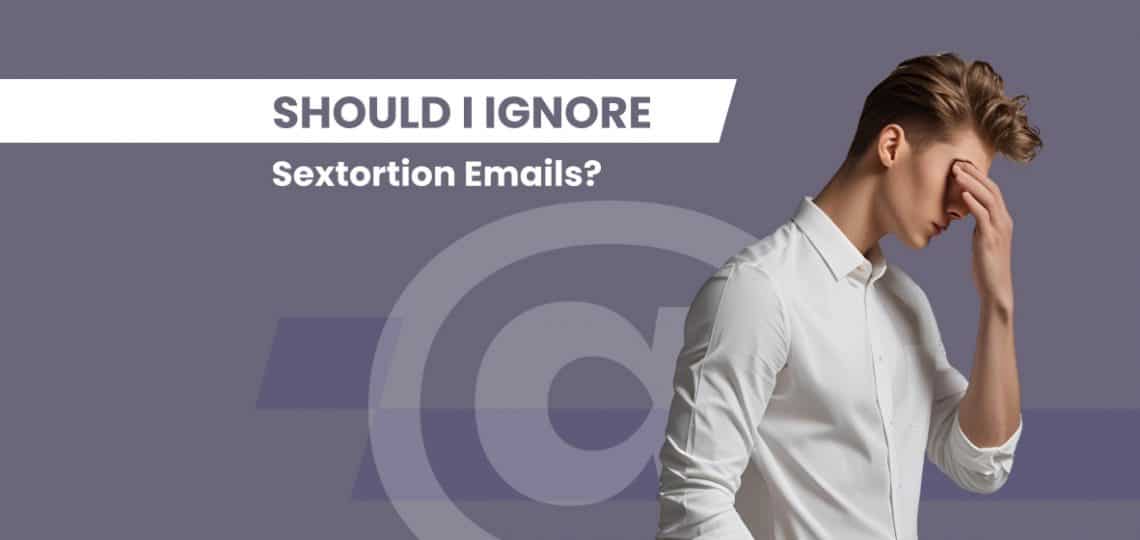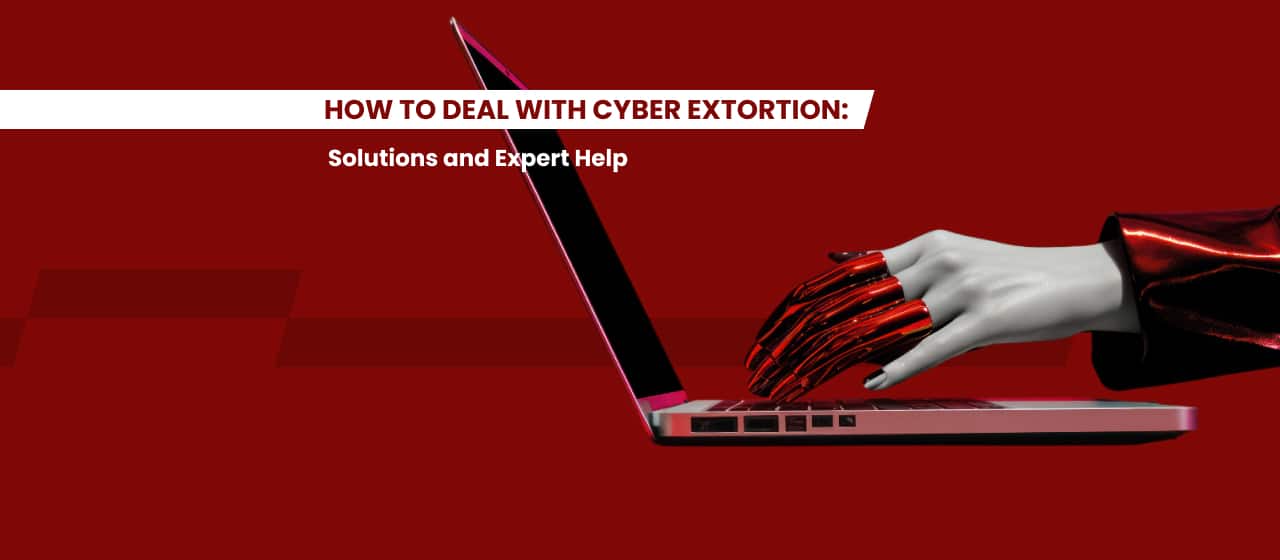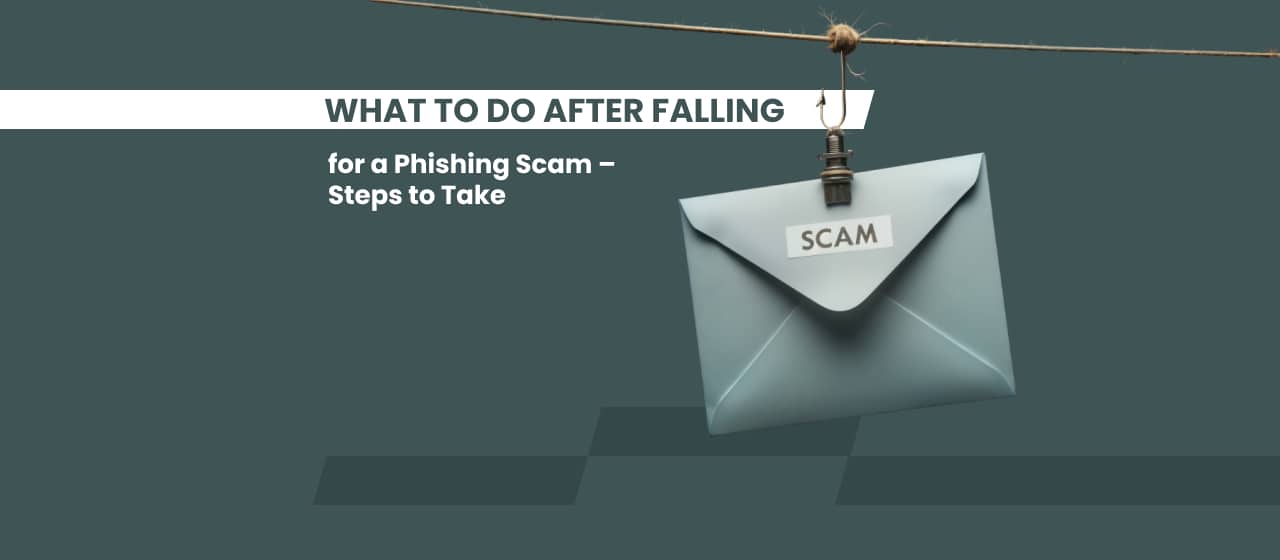It’s a quiet afternoon and you’re relaxing on your computer when you see an email you would never expect. It makes an unsettling claim: the sender has been secretly tracking your activity and recording you through your webcam. They allegedly have compromising footage and promise to expose it unless you pay $1,000 in Bitcoin. You’re startled and baffled, wondering what footage they could have. You consider responding, but you also ask yourself: Should I ignore a sextortion email?
Sextortion is a rapidly growing cybercrime that is a threat to people of all ages worldwide. Awareness of sextortion is becoming essential in the digital age, especially when it comes to sextortion emails.
What Are Sextortion Emails?
Phishing scams are most often associated with email, while social media scams are commonly linked to catfishing and sextortion. However, sextortion via email is becoming more common. Criminals take a different approach to carrying out sextortion through email. Instead of luring victims into a fraudulent relationship, perpetrators will immediately issue threats, whether they have leverage or not.
The Pegasus Email Threat
Pegasus spyware is a tool sold only to governments and nation-states to aid cybersecurity surveillance. However, sextortion emails will claim the perpetrator has obtained Pegasus spyware and accessed the victim’s data for months. The perpetrator suggests that the victim was secretly recorded in an embarrassing act and uses that for extortion. This is all an effort to push the recipient into a panic.
However, it’s important to note that these claims are often complete fabrications. They send this email hoping that the claims match up to the circumstances of a victim’s real life. Sextortionists attempt to force the victim to see meeting the financial demands of the criminal as the only solution.
Making Fake Threats Seem Credible
Sextortionists don’t just rely on empty threats to induce panic. They will also use manipulative tactics to make their claims seem convincing. In some of the more personalized sextortion emails, criminals will research the home address associated with a victim and attach a Google Maps screenshot to the email. Others may include a password that was exposed in a past data breach linked to your email. These details are meant to trick you into believing that they have compromised your devices, even when they’re secure.
Using Malware
Sextortionists may use emails designed to coerce victims into compliance. However, the intention can also be to trick victims into giving the cybercriminal access to their sensitive data. Perpetrators often claim possession of incriminating footage and may include an attachment or link with the supposed “evidence.” But the attachment or link is actually just malware, waiting to be downloaded onto your device. When a victim clicks on the link or attachment, they put their actual sensitive data at risk of exposure.
Common Phrases Used in Sextortion Emails
Sextortionists will use similar scripts, sending the same email to large amounts of people. The most common variation is known as the “Hello Pervert” email because it typically opens with that greeting. From there, the email typically uses shaming language to claim that they possess incriminating footage of you. The effectiveness of these emails relies on the recipient’s lack of awareness of their tactics. To help you recognize them, we’ve compiled a list of phrases typically found in these emails.
- “I want to inform you about a very bad situation for you.”
- “Have you heard of Pegasus?”
- “It’s been a few months since I installed it on your devices.”
- “I’ve recorded many videos of you.”
- “Every number in your contact list will receive these videos of you.”
- “This message was sent from your own Microsoft account.”
- “You have a sick perversion.”
- “I doubt you’d want your friends, family, and co-workers to know about it.”
- “I can destroy your life in a second.”
Why Am I Being Targeted?
Gone are the days when someone actually needed your private information to extort you. Now, anyone can be a target for sextortion. If you’ve received one of these emails, it’s likely that your email appeared in a previous data breach. Scammers will use exposed email addresses in their mass spam campaigns to target victims. However, in some cases, a sextortion email could come from someone you know with more personal motives. You can verify if your email address has been exposed by visiting Have I Been Pwned.
Should I Ignore a Sextortion Email?
While sextortion emails may contain false claims, they still should not be ignored. You need to be proactive to protect your privacy and help put a stop to the sextortionist’s schemes. Many victims of sextortion emails feel compelled to immediately block the sender. However, this can worsen the situation if the claims are actually true. If you ignore a sextortion email and the threats are real, the attacker may expose explicit content in retaliation. The same is true if you block them. It’s important to verify the claims or threats before deciding what to do next.
How to Respond to Sextortion Emails
So, if you aren’t supposed to ignore a sextortion email, what should you do? How victims respond to sextortion emails is an important factor in what the outcome will be. It can also factor into whether the sextortionist will continue operating without consequence. There are best practices for victims to follow to protect themselves and maintain their peace of mind. Here are the best steps to take if you’re being targeted with a sextortion email.
- Do not click any links or attachments. Sextortionists will often include links or attachments that inject malware onto your device when opened. Then, they will gain access to your sensitive data and anything compromising.
- Verify the claims safely. Perpetrators typically allege to have recorded you performing explicit acts while watching adult content. However, it should be straightforward to verify the possible truth of these claims. Is any of the evidence provided? Does the email feel copied and pasted? You should also check your devices for any malware or unauthorized access.
- Preserve the evidence. Take screenshots of the email and the header details. Keep the original message in a safe location like a special folder or archive. Make sure to also take note of date, time, and any actions you subsequently took.
- Use delay tactics. In cases where the threats or demands are fabricated, it makes sense to ignore a sextortion email. However, any real threat needs to be handled strategically. You can use delay tactics to buy time before a deadline will need to be met. Make sure the excuses are believable, such as “I have to wait until I get my next paycheck” or “I have to get the money together.” Delay tactics are effective when you are also seeking out assistance from experts or law enforcement in the meantime.
- Report to the email provider. You can report the email to the provider to help them improve the filtering of spam. Providers may also block a particular email address, domain, or IP address if enough users report the sender.
- Notify the authorities. The local police are an essential resource for victims of sextortion. They can help you file a report, documenting the crime officially. The local authorities can also help you verify the validity of the threat. If a cybercrime unit is present, they may even launch an investigation into the criminal responsible for sending the email.
- Work with cybersecurity experts. Private cybersecurity firms can help you verify if a threat is credible immediately. They can also scan your devices for any malicious programs and help strengthen your security. Certain firms specialize in protecting victims of sextortion from exposure, even detecting and removing non-consensual postings off the internet. Many of these experts, like the ones at Cyber Investigation Inc., offer immediate support. This ensures that victims can get help at any time.
If you have received a sextortion email and aren’t sure what to do next, reach out to Cyber Investigation Inc. We have experts available 24/7 to provide professional support. Contact us today to speak with one of our specialists.







